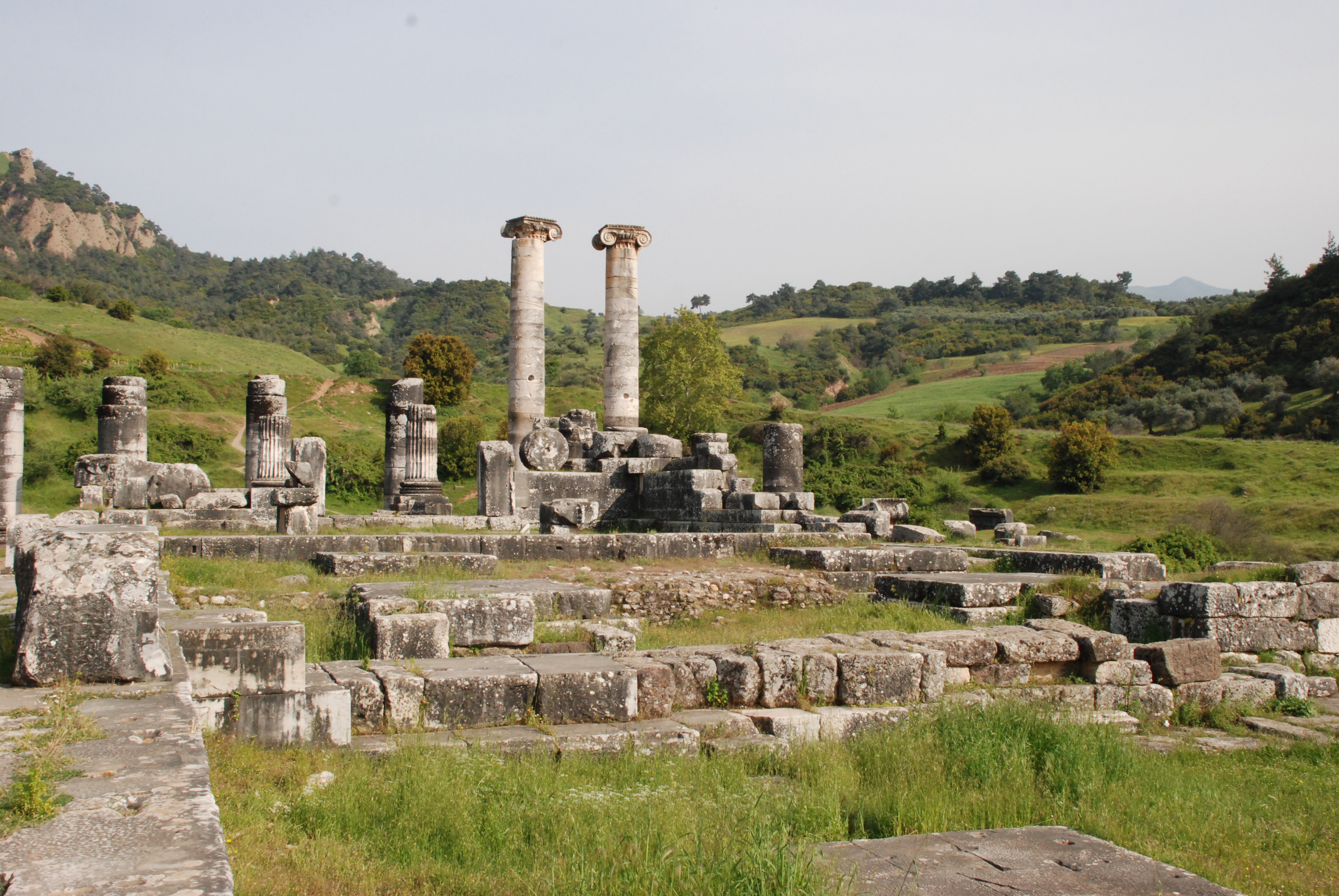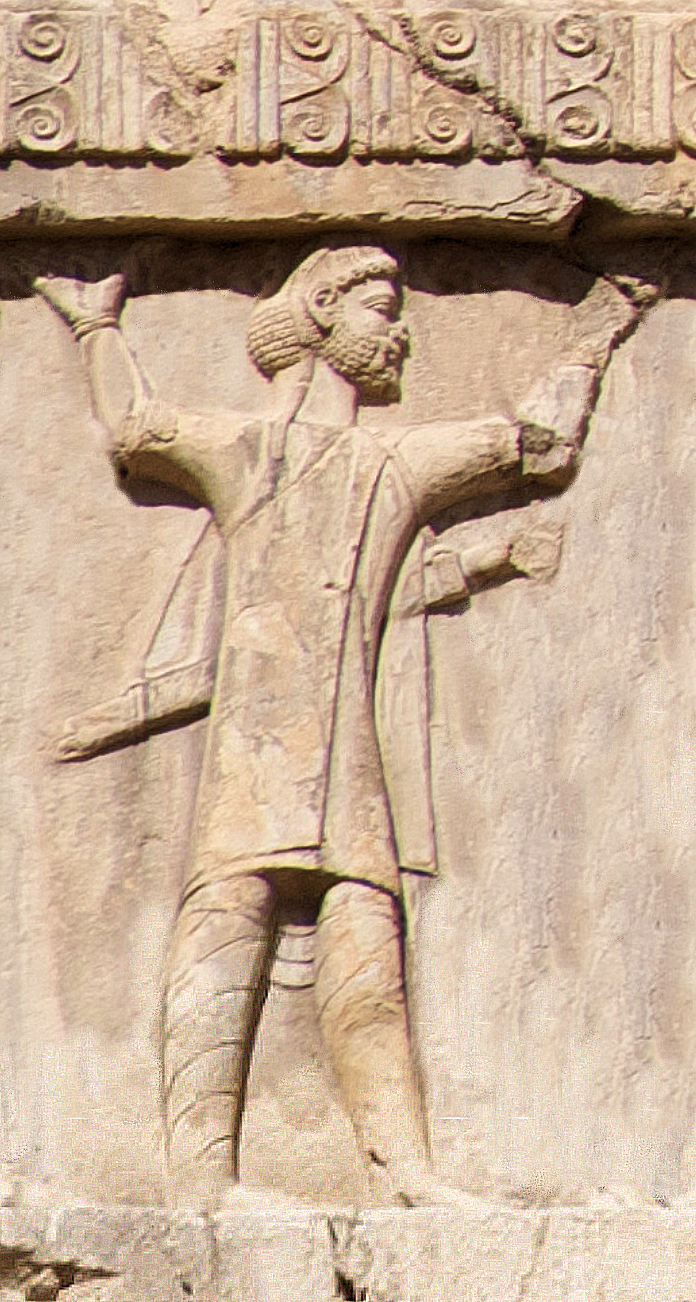|
Lydus
Lydus (Ancient Greek: Λυδός), a son of Atys and Callithea, grandson of Manes, and brother of Tyrrhenus or Torybus, is a legendary figure of the 2nd millennium BC who is attested by Herodotus to have been an early king of Lydia, then probably known as Maeonia. According to Herodotus, the country of Lydia and its people were afterwards named for Lydus, their mythical ancestor. Sources * Herodotus, I7 * , I. 27, &c. * , v. p. 219. Bibliography [...More Info...] [...Related Items...] OR: [Wikipedia] [Google] [Baidu] |
Maeonia
Lydia (; ) was an Iron Age Monarchy, kingdom situated in western Anatolia, in modern-day Turkey. Later, it became an important province of the Achaemenid Empire and then the Roman Empire. Its capital was Sardis. At some point before 800 BC, the Lydian people achieved some sort of political cohesion, and existed as an independent kingdom by the 600s BC. At its greatest extent, during the 7th century BC, it covered all of western Anatolia. In 546 BC, it became a Lydia (satrapy), satrapy of the Achaemenid Empire, known as ''Sparda'' in Old Persian. In 133 BC, it became part of the Roman Republic, Roman Asia (Roman province), province of Asia. Lydian coins, made of electrum, are among the oldest in existence, dated to around the 7th century BC. Geography Lydia is generally located east of ancient Ionia in the modern western Turkish provinces of Uşak Province, Uşak, Manisa Province, Manisa and inland İzmir Province, İzmir.Rhodes, P.J. ''A History of the Classical Greek ... [...More Info...] [...Related Items...] OR: [Wikipedia] [Google] [Baidu] |
Atys Of Lydia
Atys (Ancient Greek: Ἄτυς) is a legendary figure of the 2nd millennium BC who is attested by Herodotus to have been an early king of Lydia, then probably known as Maeonia. He was the son of Manes and the father of Lydus, after whom the Lydian people were later named. Herodotus recounts that Maeonia was beset by severe famine during Atys' reign. To help them endure hunger, the Maeonians developed various expedients including dice, knucklebones and ball games. The idea was that they would eat every other day only. On the interim days when they fasted, they would play games all day to distract their minds from hunger. Herodotus says they lived like that for eighteen years. Eventually, Atys decided to halve the population, one half to remain in Maeonia and the other half to leave and found a colony elsewhere. Lots were drawn and Atys appointed himself to stay while one of his sons, Tyrrhenus, led the colonists to Umbria where they settled and became known as Tyrrhenians. The ... [...More Info...] [...Related Items...] OR: [Wikipedia] [Google] [Baidu] |
Manes Of Lydia
Manes () is a legendary figure of the 2nd millennium BC who is attested by Herodotus in Book One of '' Histories'' to have been an early king of Lydia, then probably known as Maeonia (which he may be the eponym of). He was believed to have been the son of Zeus and Gaia, and was the father of Atys, who succeeded him as king. Atys, through Callithea, fathered Lydus, after whom the Lydian people were later named, and Tyrrhenus, after whom the Tyrrhenians were named.Herodotus, '' Histories'1.94 Later, in Book Four, Herodotus states that Manes had another son called Cotys, who, through Halie, had a son called Asies, after whom the Lydians claimed that the continent of Asia is named.Herodotus, '' Histories'4.45.3 Dionysius of Halicarnassus names Callirhoe, daughter of Oceanus, as the mother of Cotys by Manes, and Atys as the son of Cotys.Dionysius of Halicarnassus, '' Roman Antiquities'1.27.1 Genealogy See also * List of kings of Lydia Notes References * ... [...More Info...] [...Related Items...] OR: [Wikipedia] [Google] [Baidu] |
Ancient Greek
Ancient Greek (, ; ) includes the forms of the Greek language used in ancient Greece and the classical antiquity, ancient world from around 1500 BC to 300 BC. It is often roughly divided into the following periods: Mycenaean Greek (), Greek Dark Ages, Dark Ages (), the Archaic Greece, Archaic or Homeric Greek, Homeric period (), and the Classical Greece, Classical period (). Ancient Greek was the language of Homer and of fifth-century Athens, fifth-century Athenian historians, playwrights, and Ancient Greek philosophy, philosophers. It has contributed many words to English vocabulary and has been a standard subject of study in educational institutions of the Western world since the Renaissance. This article primarily contains information about the Homeric Greek, Epic and Classical periods of the language, which are the best-attested periods and considered most typical of Ancient Greek. From the Hellenistic period (), Ancient Greek was followed by Koine Greek, which is regar ... [...More Info...] [...Related Items...] OR: [Wikipedia] [Google] [Baidu] |
Tyrrhenus
In Etruscan mythology, Tyrrhenus (in ) was one of the founders of the Etruscan League of twelve cities, along with his brother Tarchon. Herodotus describes him as the saviour of the Etruscans, because he led them from Lydia to Etruria; however this Lydian origin has been debated and disputed as it contradicts archeological, cultural and linguistic evidence, as well as the view held by both the Etruscans themselves and by other Etrusco-Roman and Greek ancient sources.Dionysius of Halicarnassus, Antiquities Romanae, Book 1; Section 30.Nancy Thomson de Grummond, Etruscan Myth, Sacred History, and Legend, "Foundation Myths and Legends"; pp. 201-208. Since ancient times, doubts have been raised about the accuracy of Herodotus' claims. Xanthus of Lydia, originally from Sardis and a great connoisseur of the history of the Lydians, wasn't aware of a Lydian origin of the Etruscans and never mentioned Tyrrhenus in any part of his history as a ruler of the Lydians, as reported by Greek ... [...More Info...] [...Related Items...] OR: [Wikipedia] [Google] [Baidu] |
Herodotus
Herodotus (; BC) was a Greek historian and geographer from the Greek city of Halicarnassus (now Bodrum, Turkey), under Persian control in the 5th century BC, and a later citizen of Thurii in modern Calabria, Italy. He wrote the '' Histories'', a detailed account of the Greco-Persian Wars, among other subjects such as the rise of the Achaemenid dynasty of Cyrus. He has been described as " The Father of History", a title conferred on him by the ancient Roman orator Cicero, and the " Father of Lies" by others. The ''Histories'' primarily cover the lives of prominent kings and famous battles such as Marathon, Thermopylae, Artemisium, Salamis, Plataea, and Mycale. His work deviates from the main topics to provide a cultural, ethnographical, geographical, and historiographical background that forms an essential part of the narrative and provides readers with a wellspring of additional information. Herodotus was criticized in his times for his inclusion of "legends an ... [...More Info...] [...Related Items...] OR: [Wikipedia] [Google] [Baidu] |
Lydians
The Lydians (Greek language, Greek: Λυδοί; known as ''Sparda'' to the Achaemenids, Old Persian cuneiform Wikt:𐎿𐎱𐎼𐎭, 𐎿𐎱𐎼𐎭) were an Anatolians, Anatolian people living in Lydia, a region in western Anatolia, who spoke the distinctive Lydian language, an Indo-European languages, Indo-European language of the Anatolian languages, Anatolian group. Questions raised regarding their origins, reaching well into the 2nd millennium BC, continue to be debated by language historians and archeologists. A distinct Lydian culture lasted, in all probability, until at least shortly before the Common Era, having been attested the last time among extant records by Strabo in Kibyra in south-west Anatolia around his time (1st century BC). The Lydian capital was at ''Sfard'' or Sardis. Their recorded history of statehood, which covers three dynasties traceable to the Late Bronze Age, reached the height of its power and achievements during the 7th and 6th centuries BC, a ... [...More Info...] [...Related Items...] OR: [Wikipedia] [Google] [Baidu] |
Dionysius Of Halicarnassus
Dionysius of Halicarnassus (, ; – after 7 BC) was a Greek historian and teacher of rhetoric, who flourished during the reign of Emperor Augustus. His literary style was ''atticistic'' – imitating Classical Attic Greek in its prime. He is known for his work ''Rhōmaikē Archaiologia'' (Roman Antiquities), which describes the history of Rome from its beginnings until the outbreak of the First Punic War in 264 BC. Out of twenty books, only the first nine have survived. Dionysius' opinion of the necessity of a promotion of paideia within education, from true knowledge of classical sources, endured for centuries in a form integral to the identity of the Greek elite. Life He was a Halicarnassian. At some time after the end of the civil wars he moved to Rome, and spent twenty-two years studying Latin and literature and preparing materials for his history. During this period, he gave lessons in rhetoric, and enjoyed the society of many distinguished men. The date of his d ... [...More Info...] [...Related Items...] OR: [Wikipedia] [Google] [Baidu] |
Strabo
Strabo''Strabo'' (meaning "squinty", as in strabismus) was a term employed by the Romans for anyone whose eyes were distorted or deformed. The father of Pompey was called "Gnaeus Pompeius Strabo, Pompeius Strabo". A native of Sicily so clear-sighted that he could see things at great distance as if they were nearby was also called "Strabo". (; ''Strábōn''; 64 or 63 BC) was an ancient Greece, ancient Greek geographer who lived in Anatolia, Asia Minor during the transitional period of the Roman Republic into the Roman Empire. He is best known for his work ''Geographica'', which presented a descriptive history of people and places from different regions of the world known during his lifetime. Additionally, Strabo authored historical works, but only fragments and quotations of these survive in the writings of other authors. Early life Strabo was born to an affluent family from Amasya, Amaseia in Kingdom of Pontus, Pontus in around 64BC. His family had been involved in politics s ... [...More Info...] [...Related Items...] OR: [Wikipedia] [Google] [Baidu] |
Dictionary Of Greek And Roman Biography And Mythology
The ''Dictionary of Greek and Roman Biography and Mythology'' is a biographical dictionary of classical antiquity, edited by William Smith (lexicographer), William Smith and originally published in London by John Taylor (English publisher), Taylor, Walton (and Maberly) and John Murray (publishing house), John Murray from 1844 to 1849 in three volumes of more than 3,700 pages. It is a classic work of 19th-century lexicography. The work is a companion to Smith's ''Dictionary of Greek and Roman Antiquities'' and ''Dictionary of Greek and Roman Geography''. Authors and scope The work lists thirty-five authors in addition to the editor, who was also the author of the unsigned articles. The other authors were Classics, classical scholars, primarily from University of Oxford, Oxford, University of Cambridge, Cambridge, Rugby School, and the University of Bonn, but some were from other institutions. Many of the mythological entries were the work of the German expatriate Leonhard Schmit ... [...More Info...] [...Related Items...] OR: [Wikipedia] [Google] [Baidu] |




